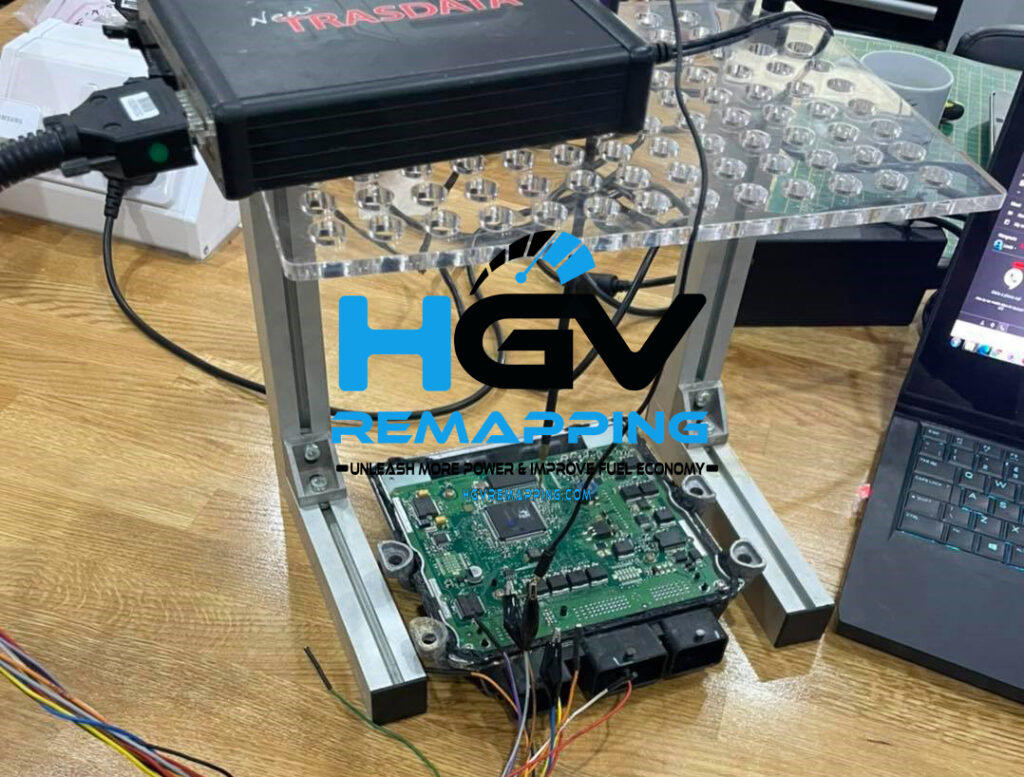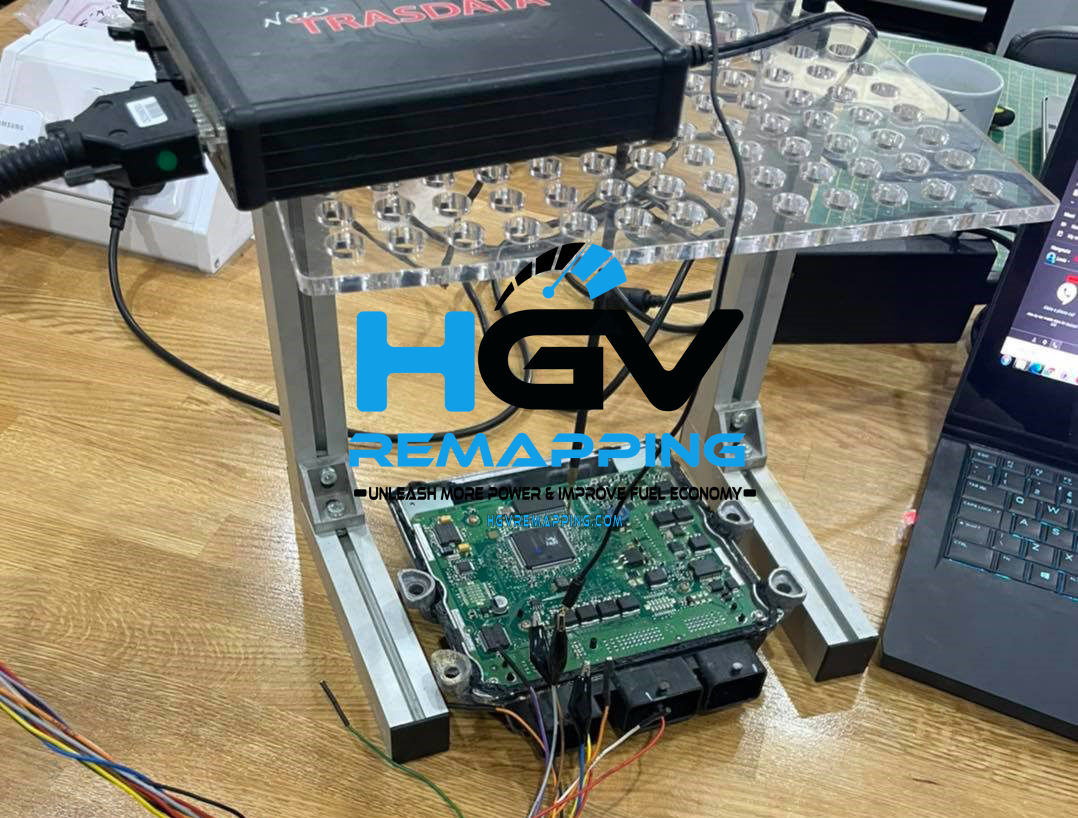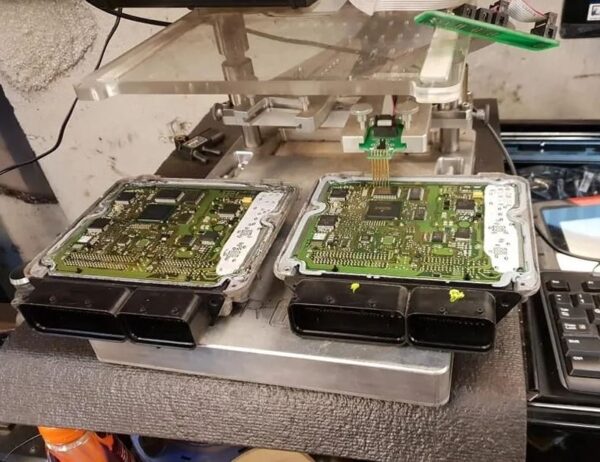ECU CLONING

HGV Remapping provides complete cloning for your ECUs. This involves full data cloning to ensure all data is extracted and transferred to your donor ECU which will be plug-and-play to your truck without any problem.
Cloning the ECU is the simplest method for seamlessly replacing a malfunctioning older ECU. This process ensures the retention of all initial specifications, including:
– Retention of the Vehicle Identification Number (VIN)
– Preservation of the Immobiliser code
– Maintenance of the Odometer reading
– Storage of the distance covered since the last service or DPF regeneration
– Preservation of any specific coding and configurations
– Upkeep of software updates or alterations, such as remapping, EGR adjustments, DPF deletion, and more.
After the ECU is cloned, it transforms into a plug-and-play component, eliminating the need for costly diagnostic equipment or a visit to the dealership.
Furthermore, even in cases where the vehicle has undergone remapping or any software modifications, those changes remain unaffected.
Through the application of this Cloning Service, we have achieved a success rate of 99% in cloning various ECU types, all at a fraction of the expense incurred when purchasing a new unit. Our requirements are straightforward: provide us with both ECU units possessing matching part numbers or identical hardware configurations, and let us take care of the rest.
HGV Remapping provides complete cloning for your ECUs. This involves full data cloning to ensure all data is extracted and transferred to your donor ECU which will be plug-and-play to your truck without any problem.
Cloning the ECU is the simplest method for seamlessly replacing a malfunctioning older ECU. This process ensures the retention of all initial specifications, including:
– Retention of the Vehicle Identification Number (VIN)
– Preservation of the Immobiliser code
– Maintenance of the Odometer reading
– Storage of the distance covered since the last service or DPF regeneration
– Preservation of any specific coding and configurations
– Upkeep of software updates or alterations, such as remapping, EGR adjustments, DPF deletion, and more.
After the ECU is cloned, it transforms into a plug-and-play component, eliminating the need for costly diagnostic equipment or a visit to the dealership.
Furthermore, even in cases where the vehicle has undergone remapping or any software modifications, those changes remain unaffected.
Through the application of this Cloning Service, we have achieved a success rate of 99% in cloning various ECU types, all at a fraction of the expense incurred when purchasing a new unit. Our requirements are straightforward: provide us with both ECU units possessing matching part numbers or identical hardware configurations, and let us take care of the rest.

What is ECU Cloning?

ECU cloning is the process of duplicating the data and settings from one vehicle’s Engine Control Unit (ECU) onto another ECU.
ECU cloning is often utilized when a vehicle’s ECU becomes faulty, damaged, or needs to be replaced. Instead of programming a new ECU from scratch, which can be time-consuming and may require reconfiguring various settings, ECU cloning offers a way to transfer all the relevant information and configurations from the original ECU to a replacement unit.
The process typically involves using specialized equipment and software to read the data from the original ECU and then write it onto the replacement ECU. This ensures that the replacement ECU functions exactly like the original one, maintaining the same settings, performance characteristics, and any modifications that have been made, such as engine tuning or remapping.
ECU cloning is particularly useful in situations where the original ECU has unique data tied to the vehicle, such as immobilizer codes, VIN (Vehicle Identification Number), mileage readings, and specialized coding. By cloning the ECU, the replacement unit can seamlessly integrate with the vehicle’s existing systems without the need for extensive reprogramming.
What is an ECU?
The Engine Control Unit (ECU) functions is a sophisticated computerized system tasked with overseeing and managing a vehicle’s engine performance and emissions. It receives inputs from an array of sensors throughout the vehicle, including the oxygen and throttle position sensors. This information is then utilized to tune the engine’s functions finely.
Within a vehicle’s engine management system, the ECU’s significance lies in its pivotal role of governing the air-fuel mixture, ignition timing, and other critical facets of engine operation. By harnessing data from sensors, it computes the ideal air-fuel ratio for the engine and subsequently adjusts fuel injection and ignition timing to uphold this balance. This process is pivotal for optimizing both engine performance and fuel efficiency, while concurrently curtailing emissions.
Beyond its role in maintaining equilibrium, the ECU also diligently monitors the engine’s performance and emissions levels. It engages in adaptive adjustments to ensure the engine adheres to safety standards and emission regulations when necessary. For instance, if the oxygen sensor identifies an overly lean mixture (excess air and insufficient fuel), the ECU promptly counteracts this by augmenting fuel injection to restore equilibrium.
The ECU can elevate driving experiences in engine performance by modulating torque, horsepower, and other critical parameters. This translates to heightened power when demanded by the driver, achieved through fine-tuned engine timing, valve timing adjustments, and optimized fuel injection.
The ECU emerges as an indispensable component, orchestrating the intricate symphony of regulating and overseeing engine performance and emissions within a vehicle. It carries out this responsibility by assimilating information from diverse sensors dispersed throughout the vehicle, processing this data to execute precise engine control, and continuously monitoring the engine’s overall health and emissions output. Grounded in this analysis, the ECU implements necessary alterations, assuring the engine operates securely and aligns with stringent emissions criteria.
Understanding the ECU Cloning Process
ECU cloning is the procedure of duplicating software and data from one Engine Control Unit (ECU) to another. The typical process encompasses these key steps:
1. Extracting data from the original ECU:
The original ECU is linked to a specialized tool that can access and retrieve the software and data stored within the ECU. This initial step is referred to as “reading” the ECU.
2. Archiving the original ECU’s data:
The software and data from the original ECU are then saved onto a computer or another storage device. This phase is termed “dumping” the data from the original ECU.
3. Preparing the replacement ECU:
The replacement ECU, set to receive the software and data from the original ECU, undergoes readiness for the cloning operation. This may include erasing existing software and data on the replacement ECU or making necessary hardware adjustments.
4. Transferring the original ECU’s data to the replacement ECU:
Subsequently, the software and data procured from the original ECU are written onto the replacement ECU. This process is known as “flashing” the replacement ECU.
5. Validating the replacement ECU:
The replacement ECU connects to a diagnostic scanner to confirm that the software and data on the replacement unit correspond to those of the original ECU. This step verifies the accuracy of the cloned content.
6. Integrating the replacement ECU:
With the confirmation of accurate data matching, the replacement ECU is installed into the vehicle and linked to the engine management system. A comprehensive assessment ensures proper functionality and alignment with the vehicle’s requirements.
The positive aspect is that when opting for HGV Remapping, you can experience a sense of assurance, knowing that your vehicle is entrusted to capable experts. It’s vital to engage with an ECU specialist who comprehends your vehicle and is equipped to address any potential complexities that might arise during the ECU cloning process.
